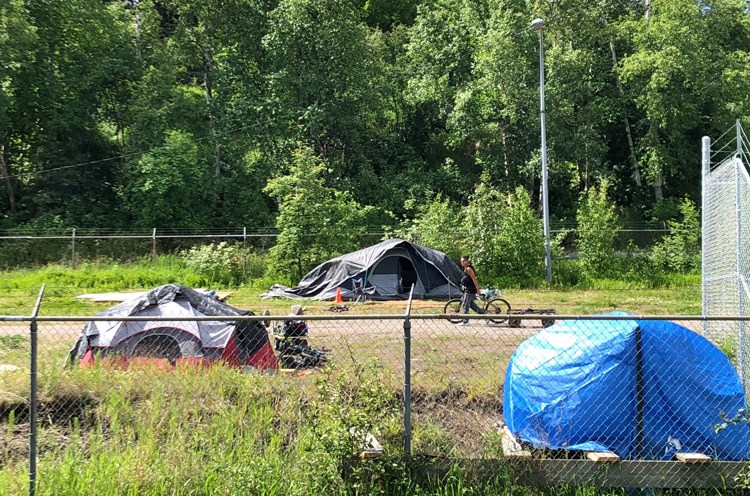Together We Stand are organizing a second rally against the city's Safe Streets Bylaw on Monday evening.
The bylaw, which is going before city council for final approval on Monday, would allow bylaw officers could issue $100 tickets, with a $75 penalty for late payment, for a variety of "nuisance" behaviours including panhandling, loitering, open drug use and camping in public areas.
Together We Stand will be holding a rally starting a 6 p.m. at the Fifth Avenue homeless encampment, at the corner of Fifth Avenue and Ottawa Street. The group previously held a rally on the lawn of city hall in June 14, when council approved the first three readings of the bylaw.
"The Together We Stand group believes that these bylaw amendments increase chaos for (Prince George) citizens, Indigenous organizations, social services and businesses, and criminalize the poor," a statement issued by rally organizers said. "Together We Stand calls for immediate action at municipal, provincial, and federal levels to declare homelessness an emergency in Prince George, and to escalate support for homeless and precariously housed community members who reside in the community."
The group says city council hasn't conducted sufficient consultation with the community, including several local Indigenous leaders who wrote to council requesting a chance to discuss the impact of the bylaw.
City council received several letters and emails opposing the implementation of the Safe Streets Bylaw.
Together We Stand member Gerry Healy requested that council postpone the decision until more consultation can be done.
"It is our hope and vision to have our people from the streets treated with every kindness we would show to all our other citizens," Healy wrote. "Helping them find a home instead of further driving them down with bylaws that inhibit their growth."
Susan Phillips said the city should be providing basic amenities like access to bathrooms and clean water, not handing out tickets.
"I am writing to express my dismay and disappointment at your recent bylaw amendments, which target members of the homeless population, further destabilizing their situations and turning desperate people into criminals. Where is your sense of humanity?" Phillips wrote. "I abhor the idea that some of my neighbours are abusing and complaining about people tenting below Patricia Avenue. To me, that is a perfect place for people to live."
City council is perpetuating racial inequalities that go back generations, she said.
"In the light of recent findings at residential schools, there is no denying how skewed society has become because of racist inequalities that go back for generations," Phillips wrote. "What legacy are you leaving in further perpetuating these inequalities, further criminalizing those who can’t afford a place to live and who ask only for a space to live on?"
Social sciences researcher Amelia Merrick said the city doesn't have an adequate handle on the problems, and the Safe Streets Bylaw is an ineffective and inefficient way to address them.
"The funding used to enforce bylaws would be more efficiently used to support housing or social programs so that people have a safe and affordable place to go during daytime hours, thus reducing loitering, open drug use and aggressive panhandling," Merrick wrote. "Without addressing our housing crisis or providing safe and affordable places for people to go during the daytime hours, this bylaw will likely only increase chaos and hostility. The bylaw does not offer tools to move people off the streets, instead it expands tools to criminalize people for not having living rooms and 'shuffle people along.'"
MOVING PEOPLE ALONG NOT THE ANSWER: CHAMBER
Prince George Chamber of Commerce CEO Todd Corrigall said social issues in Prince George aren't just a downtown problem.
"Social challenges have impacted businesses throughout Prince George for more than a decade," Corrigall said in an email. "This includes break and enters, discarded paraphernalia, human waste and other contraband. This has created challenges for some businesses, as unkempt areas can act as deterrents for patrons."
Years of neglecting to address the issues has resulted in the current crisis, he said.
"First and foremost, housing must be the primary focus," Corrigall said. "Secondly, we need to adjust provincial outcomes to focus on the 4 Pillars approach, and not targeting harm reduction as the be all solution. This has been tried and shown to only escalate the discontent amongst differing groups."
Addiction treatment programs, housing, supporting the RCMP and mental health services like the Car 60 programs will all make a positive difference in the city.
"We believe that laws are required to maintain any community – housed or homeless," Corrigall said. "However, what we cannot do is continue to displace people from one area to another, day after day. While jurisdiction plays a role in the conversation, kicking the can down the road has resulted in our current situation."
Downtown Prince George was approached for comment by the Citizen, but declined to respond.



